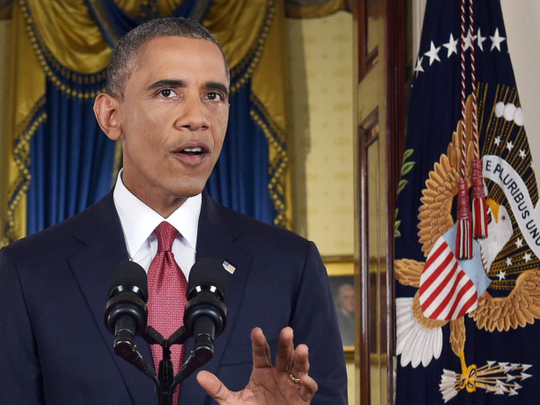
“Prediction is difficult, especially about the future,” Yogi Berra once said. Wait — let me correct that. It wasn’t Yogi Berra; it was Niels Bohr. Or maybe Mark Twain. It’s correction time. For columnists, the end of the year is a time to shed the flimsy mantle of omniscience and eat some crow. That’s easy to do when your job is to think out loud twice a week.
At the beginning of 2014, I forecast bravely that after a rough 2013, capped by the disastrous rollout of his health care plan, things might be looking up for President Barack Obama.
For one thing, he had nowhere to go but up; his popularity was near an all-time low. For another, I offered, “2014 is an election year, and Obama has always been better at campaigning than governing.” I must have forgotten the drubbing his party took in the 2010 midterm election when Obama campaigned vigorously.
“If he can survive Year 6 with a healthy economy, healthcare intact, the Senate in Democratic hands and no new disasters, that will look like success,” I concluded.
So how did Obama do? Two out of four. The economy’s in good shape, and unemployment is slowly falling. Obamacare is rumbling ahead, although the Supreme Court could complicate that soon. On the other side of the ledger, the Democrats lost the Senate by a wide margin.
As for “no new disasters,” that’s mostly true — although events did pull the president into a war in Iraq that he didn’t want to fight. His popularity? Still near an all-time low.
While we’re on elections, though, I want to point out that I wasn’t consistently wrong — or even consistent. By March, I was predicting — not very boldly — that this year’s congressional elections overall would be a loss for the Democrats, because that’s what often happens to the party that controls the White House in the sixth year of a presidency.
Charlie Cook, the dean of congressional-election prognosticators, called their prospects “grisly” — good word! — and said Republicans might well pick up the six seats they needed for a Senate majority. “Unless the economy and Obamacare look better to voters seven months from now, don’t be surprised to see the GOP do even better than that,” I wrote in a moment of abnormal wisdom. In November, the GOP did much better, by adding nine Senate seats.
I didn’t stay that smart for long, though. In September, I wrote that the battle for the Senate was narrowing.
“Endangered Democratic incumbents in North Carolina and Alaska are waging surprisingly strong campaigns,” I wrote, “and a Republican incumbent in Kansas is in unexpected trouble.”
Not even close. Those Democratic incumbents in Alaska and North Carolina lost decisively, and the “endangered” Kansas Republican won by 10 percentage points. What went wrong? My journalistic bias kicked in. Not partisan bias; dramatic bias. Like most reporters, I yearn for close elections, not landslides. All it took was a few suggestive polls.
Unexpected win for bipartisanship
But the election wasn’t just a horse race; it was a battle over how the country should be governed. Did the GOP victory presage two more years of gridlock, or would Republicans find a way to make Congress work again?
I was a sceptic. When the House of Representatives took up a bill to fund the federal government through most of 2015, tea party Republicans said they’d block it unless Obama reversed his decision to allow millions of immigrants to stay in the country illegally. “Last month’s election didn’t change Congress much, at least in the short run,” I wrote after hearing them rage. “We’re still heading toward the same kind of cliffhanger that we’ve seen on spending bills for the last three years.”
As it turned out, we weren’t. Dozens of Democrats joined with pragmatic Republicans to pass a spending bill in an unexpected win for bipartisanship. Did I get anything right? Sure.
I managed to figure out early in the year that both Hillary Rodham Clinton and Jeb Bush were serious about running for president. When near panic broke out over Ebola, I wrote that the fear seemed out of proportion to the risks in the US.
And, unfortunately, I was right about at least one long-term trend in foreign policy: The global chaos that’s becoming the new normal.
“The reason isn’t that the great powers are no longer powerful,” I wrote. “The difference is that their opponents — balky local governments, insurrectionists and militants alike — are more potent than they used to be ... [and] powers like the US have lost their appetite for fighting long counterinsurgency wars.”
But let’s finish the year on a more optimistic note.
You’d think I’d have learned by now that predicting a successful year for Obama is a triumph of hope over experience. But here’s what I wrote in November:
“By the end of Obama’s presidency, the Federal Reserve projects, unemployment will have fallen from the current 5.8% to somewhere near 5%,” I wrote.
“If that keeps up, Barack Obama just might leave the White House in January 2017 in a glow of success ... as the president who ended the Great Recession, brought two wars to a close and made health insurance available to millions.”
Sound unlikely? Sure. But let’s see how things look a year from now. If I was wrong, I promise to fess up.
—Los Angeles Times










